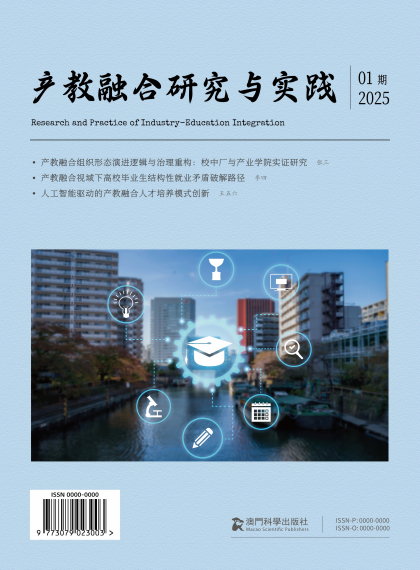摘 要:
面对经济社会发展的新要求和时代背景下的产教融合征程,本研究从产教融合理念出发,提出了一种以"四体(企业、学校、学生、社区)四融(教育融入企业、企业融入教育、学生融入就业、就业融入学生)"为核心的新机制和模式,基于义乌工商职业技术学院的实践探索进行阐述。研究发现,运用"四体四融"模式可以真正实现学校教育与企业需求的深度融合,以及学生能力的提升与就业需求的匹配,履行社区的责任和服务。研究结果显示,此模式可以促进学生的理论素养和实践技能的双重提升,提升就业竞争力,同时也推动了学院与企业、社区的互动和协同发展,表现出产教融合新机制的优势。因此,研究结果有望为我国其他职业教育机构提供行之有效的实践案例和启示,推动其深度产教融合的进程。
关键词:产教融合;四体四融;职业技术学院;实践探索;就业竞争力
Abstract:
Facing the new requirements of economic and social development and the journey of industry-education integration in the context of The Times, this study, starting from the concept of industry-education integration, proposes a new mechanism and model centered on "Four Bodies (enterprises, schools, students, communities) and Four integrations (education integrating into enterprises, enterprises integrating into education, students integrating into employment, and employment integrating into students)". This paper is elaborated based on the practical exploration of Yiwu Industrial & Commercial College. Research has found that the application of the "Four Bodies and Four Integrations" model can truly achieve a deep integration of school education and enterprise demands, as well as a match between the improvement of students' abilities and employment demands, and fulfill the responsibilities and services of the community. The research results show that this model can promote the dual improvement of students' theoretical literacy and practical skills, enhance their employment competitiveness, and at the same time, it also promotes the interaction and coordinated development between the college and enterprises and communities, demonstrating the advantages of the new mechanism of integrating industry and education. Therefore, the research results are expected to provide effective practical cases and inspirations for other vocational education institutions in our country, promoting the process of their in-depth integration of industry and education.
Keywords: Integration of industry and education; The Four Bodies and Four Integrations; Vocational and technical college; Practical exploration;Employment competitiveness
--
